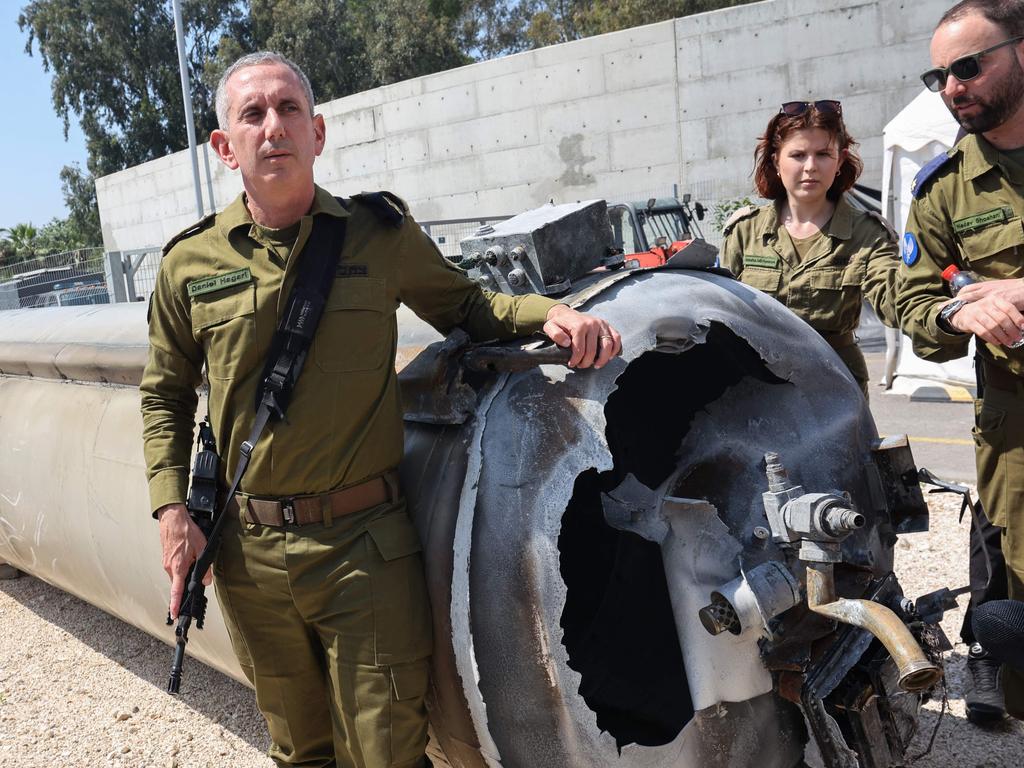Middle East on edge as Israel and Iran trade revenge vows
Washington, Israel’s top ally and arms supplier, has made clear it will not join Israel in any attack on their common adversary Iran.

Israel and Iran traded threats overnight on Tuesday after Tehran’s first-ever direct attack on its arch-foe sharply heightened regional tensions as the Gaza war ground on with no truce in sight.
Israeli military spokesman Daniel Hagari said Iran would not get off “scot-free” after Tehran launched a barrage of more than 300 missiles, drones and rockets at Israel at the weekend.
“We cannot stand still from this kind of aggression,” Rear Admiral Hagari said, a day after Israel’s military chief vowed there would be “a response” to Iran’s offensive.
Iran said its attack was an act of self-defence following a deadly Israeli airstrike on its consulate in Syria, and that it would consider the matter “concluded” unless Israel retaliated.
Iran’s President Ebrahim Raisi warned that “the slightest action against Iran’s interests would definitely be met with a severe, extensive and painful response”.
US President Joe Biden has stressed “the US is committed to Israel’s security” and wants to prevent the conflict from spreading.
Washington, Israel’s top ally and arms supplier, has made clear it will not join Israel in any attack on their common adversary Iran, a senior US official said.
World leaders have urged restraint and de-escalation.
During a phone call with Iran’s Mr Raisi, Russian President Vladimir Putin called on both sides to “prevent a new round of confrontation fraught with catastrophic consequences for the entire region”, the Kremlin said.
British Prime Minister Rishi Sunak warned his Israeli counterpart Benjamin Netanyahu against “significant escalation” and said now was a moment for “calm heads to prevail”.
Throughout, Israel has kept bombing targets in Gaza, the Hamas-ruled coastal territory that has been devastated by more than six months of war and a siege on its 2.4 million people.
Since the Iranian attack, Mr Netanyahu has twice convened his war cabinet, set up after Palestinian militant group Hamas launched the October 7 attack that sparked the bloodiest ever Gaza war.
Israel was weighing its options after the Iranian drone and missile onslaught, which caused little damage as Israeli defences intercepted most projectiles, helped by US, British and French forces as well as regional allies.
It remained unclear when Israel might strike and whether it would target Iran directly or attack its interests or allies abroad in places such as Lebanon, Syria, Iraq and Yemen.
On Monday, Israel made its first official comment on the April 1 Damascus strike that killed seven Iranian Revolutionary Guards including two generals. “These were people who engaged in terrorism against the state of Israel,” Admiral Hagari said.
Israeli Foreign Minister Israel Katz called for more sanctions to be imposed on Iran.
The EU’s foreign policy chief Josep Borrell said Brussels was starting work on expanding sanctions on Tehran, while US Treasury Secretary Janet Yellen said Washington would “not hesitate” to tighten sanctions.
Israel’s military has vowed the tensions with Iran will not distract it from the ongoing war in Gaza, where it aims to destroy Hamas and bring home the hostages taken during the Hamas attack.
On Tuesday, Mr Netanyahu told new army recruits that Israeli forces were fighting Hamas “without mercy”.
Truce talks appear to be stuck after the latest proposal did not get Hamas approval.
The Hamas attack that started the war on October 7 resulted in the deaths of about 1200 people, mostly civilians. The militants also took about 250 hostages, of whom Israel estimates 129 remain in Gaza, including 34 who are presumed dead.
Israel’s retaliatory offensive has killed at least 33,843 people in Gaza, mostly women and children, according to the health ministry in the Hamas-run territory.
The ministry reported that 15 people, including children, were killed on Tuesday in the southern city of Khan Younis.
The Israeli army said that in combat in Gaza, its tanks killed “a number of terrorists identified advancing towards them”.
Israel has faced growing global opposition to the relentless fighting that has turned to ruins vast areas of Gaza and triggered a dire humanitarian crisis in Gaza.
The UN agency for Palestinian refugees, UNRWA, said there had been “no significant change” in the amount of humanitarian relief entering Gaza, even after the International Court of Justice ordered Israel to allow in more aid.
The UN said it would launch an appeal on Wednesday for $US2.8bn ($4.4bn) to help Gaza, as well as the West Bank.
AFP




To join the conversation, please log in. Don't have an account? Register
Join the conversation, you are commenting as Logout